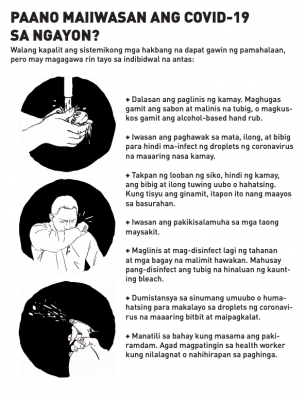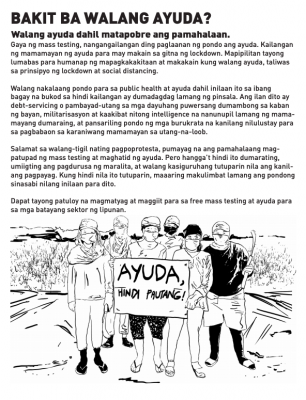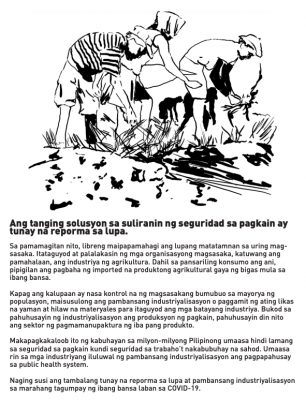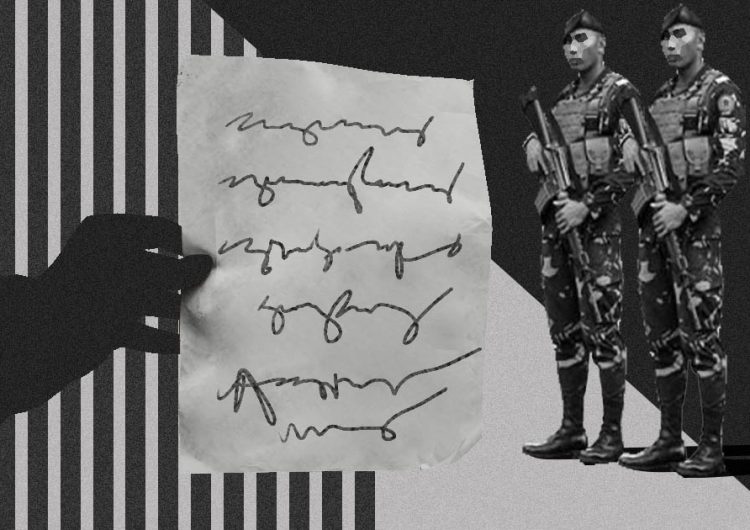True to their word, police have indeed doubled down on arrests as stricter quarantine protocols are implemented following the extended lockdown.
Volunteers from Sagip Kanayunan and Tulong Anakpawis were flagged by police last week in Norzagaray, Bulacan for violating quarantine protocols and conducting relief operations without a permit.
The Department of the Interior and Local Government spokesperson Undersecretary Jonathan Malaya called the volunteers “pasaway,” and claimed they put everyone in Bulacan at risk for a “propaganda stunt,” referring to the printed materials Norzagaray police found in the confiscated relief packs.
Read more: It’s about time we put a stop to the “pasaway” narrative
Artist alliance Sama-samang Artista para sa Kilusang Agraryo (SAKA) defended their work against government officials and reports “vilifying” it. They confirmed that the materials were included in the relief packs and were in fact shared for public viewing online.
One of the materials that Bulacan police found slipped inside the packs is a 12-page illustrated primer on COVID-19 created by SAKA, who shared it on their Facebook page prior to the relief ops.
On the cover of the primer are the words “May kumakalat na sakit. Kasabay nitong kumakalat ang kapabayaan ng gobyerno” (A disease is spreading, and so is the government’s negligence). The digital file may be accessed here.
The primer aims to answer eight frequently asked questions about the ongoing health crisis:
- Ano ba’ng meron at nila-lockdown tayo? (Why is the lockdown necessary?)
- Ano ba ang coronavirus? (What is the coronavirus?)
- Sapat ba ang lockdown para pigilan ito? (Is the lockdown enough to prevent further spreading the disease?)
- Bakit ba walang mass testing? (Why is mass testing not available?)
- Bakit ba walang ayuda? (Why is financial aid not available?)
- Bakit ba walang makain? (Why is food hard to come by?)
- Paano maiiwasan ang COVID-19 sa ngayon? (How can we protect ourselves from the disease?)
- Ano ang ating mga panawagan? (What are our calls to action?)
Each page of the primer contains information on the pandemic. The first few pages discuss the origin of the disease as well as its symptoms, the complications of being asymptomatic and how to prevent from getting infected. Page 11 contains recommendations to do so including hand washing, covering one’s mouth when sneezing or coughing and disinfecting one’s home.

Pages seven to nine go into further detail on the group’s call to action. Here, the group criticizes the government’s decisions that contributed to the lack of financial aid and initiatives for mass testing.

Page 10 discusses the group’s proposed solution to address both the farmers’ plight and the food shortage amid the pandemic―land reform. They propose that giving farmers their own livelihood, as opposed to letting them drown in debt from renting from landowners, will also improve the country’s agricultural industry.

“The [COVID-19] primer is by no means a secret publication that we hide among vegetables to covertly distribute among communities in what the PNA refers to as ‘masquerade activities,’” SAKA wrote in a statement on Facebook.
They also urged the government and police to read the materials if they are “serious about their injunction to ‘heal as one.’”
“They can learn a thing or two about basic human rights [which] we talk constantly about in the publications they censor.”
It is true that people may be prone to committing mistakes or violations of the law during a time of uncertainty, fear and collective trauma, which calls for human compassion. While compassion should not drive us to violate the law, we can only hope that the law is applied equally to every person.
Header art by Kristine Yap

























Comments